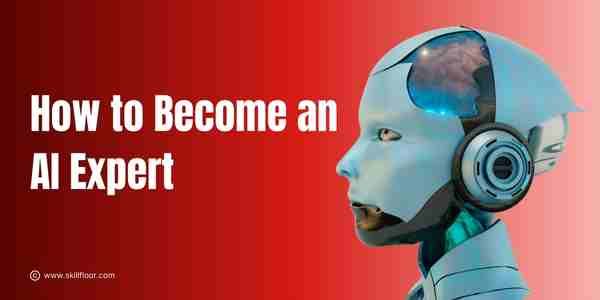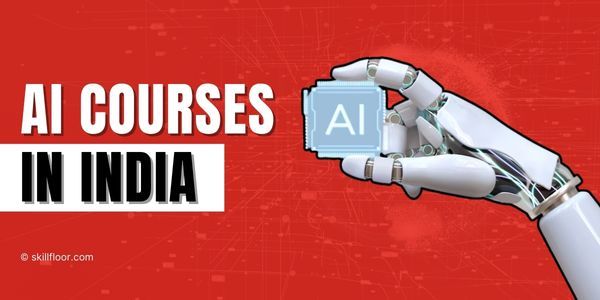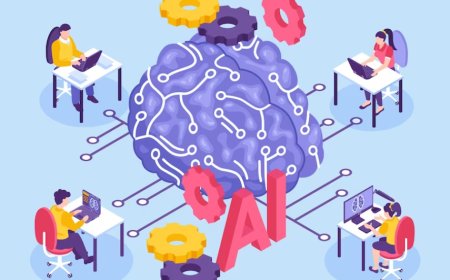How to Become an AI Expert
Learn how to become an AI expert with a step-by-step roadmap, from building a strong foundation in programming and math to gaining real-world experience and exploring AI careers.

Artificial Intelligence (AI) is changing how we live, work, and interact with technology. From personal assistants like Siri and Alexa to self-driving cars, AI is being used in many areas of our lives. As more companies adopt AI to improve their products and services, there is a high demand for people who understand AI and can create solutions using it.
Becoming an AI expert opens the door to exciting job opportunities, creative problem-solving, and good pay. However, since AI covers many complex topics, learning how to work in this field can feel confusing and difficult.
Challenges of Becoming an AI Expert
The road to becoming an AI expert isn’t simple. AI is a broad topic in many areas, such as machine learning, deep learning, and natural language processing (NLP). You need to learn about math, programming, and computer science. Plus, AI technology changes quickly, with new tools and ideas constantly appearing.
Many people who want to work in AI are unsure where to start or which skills are most important. They might wonder what type of education they need or how to get practical experience.
What Does It Take to Become an AI Expert?
So, how can you become an AI expert? Below, I’ll guide you through the steps you can take to learn about AI, from the basic skills you need to job roles you can aim for.
A Step-by-Step Roadmap to Becoming an AI Expert
1. Build a Strong Educational Foundation
Education as the Starting Point
A solid educational background is crucial for anyone aspiring to work in AI. While formal education in computer science, engineering, or mathematics can provide a great start, it is not a strict requirement. Many successful AI professionals come from diverse backgrounds but share a commitment to mastering essential skills. Here’s how to build a strong foundation:
-
Mathematics for AI: Mathematics is the bedrock of AI algorithms. Concepts like linear algebra, calculus, probability, and statistics are integral to understanding how AI models function. If you’re new to these topics, online platforms like Skillfloor offer accessible, high-quality courses.
-
Linear Algebra: Critical for understanding data transformations and neural networks.
-
Calculus: Necessary for optimizing algorithms and understanding gradient-based learning.
-
Probability and Statistics: Helps you grasp data distributions, inferencing, and model evaluation.
Computer Science Fundamentals: Proficiency in computer science is vital for building, testing, and optimizing AI models. Key areas include:
-
Data Structures and Algorithms: Understanding how data is organized and processed is crucial for AI applications. This knowledge enables the design of efficient algorithms and the optimization of performance.
-
Software Engineering Principles: AI professionals often work in collaborative environments where writing maintainable and scalable code is critical.
Programming Skills: AI experts must be proficient in programming, as coding is central to building AI systems. Python is the language of choice for most AI projects due to its simplicity, versatility, and extensive library support. However, other languages like R, Java, and C++ are also relevant, depending on specific applications.
-
Python Libraries: Familiarize yourself with libraries such as NumPy, Pandas, Matplotlib, TensorFlow, PyTorch, and scikit-learn. These tools facilitate data manipulation, visualization, and model building.
Practical Tip: Apply what you learn by building small projects, such as data analysis scripts, simple chatbots, or predictive models. Hands-on practice solidifies your knowledge and boosts your confidence.
2. Master AI Fundamentals
Understanding the Building Blocks of AI
Once you have a foundational knowledge of programming and mathematics, it’s time to delve into AI fundamentals. AI encompasses a range of concepts and technologies, each with its unique applications:
Machine Learning (ML): ML is a subset of AI focused on creating algorithms that learn and improve from experience. It involves three primary types:
-
Supervised Learning: The model is trained on labeled data to make predictions (e.g., image classification).
-
Unsupervised Learning: The model works with unlabeled data to identify patterns (e.g., clustering).
-
Reinforcement Learning: The model learns through trial and error in an interactive environment (e.g., game-playing agents).
I recommend starting with the Machine Learning course on Skillfloor, which provides a solid foundation in key ML concepts and hands-on experience with AI technologies.
Deep Learning (DL): Deep learning leverages artificial neural networks to enable complex data transformations and decision-making processes. Mastering deep learning involves studying:
-
Convolutional Neural Networks (CNNs) for image processing.
-
Recurrent Neural Networks (RNNs) for sequential data, such as time-series analysis and text processing.
-
Generative Adversarial Networks (GANs) for creating synthetic data and images.
Tools like TensorFlow and PyTorch are invaluable for building and experimenting with deep learning models.
Natural Language Processing (NLP): NLP focuses on enabling machines to interpret and interact with human language. Common applications include sentiment analysis, language translation, and chatbot development. Familiarity with text preprocessing, tokenization, and language modeling is essential.
Real-World Example: As you explore AI fundamentals, work on projects like building a movie recommendation system, a facial recognition model, or a sentiment analysis tool. These projects allow you to apply your knowledge and deepen your understanding.

3. Pursue Specialized AI Courses and Certifications
Why Specialization Matters
Given the breadth of AI, specializing in a specific area can make you more competitive in the job market and help you become an expert in a niche domain. I chose to focus on deep learning due to its growing influence on various applications, but there are numerous options to explore:
-
Deep Learning Specialization: Courses offered by institutions like DeepLearning.AI cover topics like neural networks, convolutional networks, and sequence models.
-
Reinforcement Learning: This specialization is particularly valuable for building AI agents capable of learning from their environment, used in robotics and gaming.
-
AI for Business: Focused on applying AI solutions to solve business problems, such as customer segmentation and demand forecasting.
Earning certifications from reputable organizations, such as Microsoft, Google, and Amazon, can also validate your expertise and enhance your credibility in the industry.
Are you interested in knowing more Refer:-
4. Gain Real-World Experience through Projects and Collaboration
Practical Experience Is Key
AI is a highly practical discipline; learning through real-world projects is essential. Start with simple projects and gradually increase the complexity as you gain confidence and expertise:
-
Data Analysis Projects: Analyze datasets using Python libraries like Pandas and Matplotlib to derive insights and build data-driven solutions.
-
Machine Learning Models: Create models that solve practical problems, such as spam detection, predictive modeling, and customer churn analysis.
-
Deep Learning Applications: Experiment with CNNs for image recognition, RNNs for sequence prediction, and GANs for data synthesis.
Collaboration and Networking
Engaging with AI communities and collaborating with others accelerates your learning and provides exposure to different perspectives and challenges. Consider joining forums like Stack Overflow, Reddit’s r/MachineLearning, and AI-specific Discord servers. Contributing to open-source projects on GitHub also demonstrates your skills to potential employers and helps you gain recognition within the AI community.
5. Explore AI Roles, Responsibilities, and Career Paths
Key Roles in the AI Industry
As you gain expertise, it’s important to understand the various career paths available in AI. Each role comes with its responsibilities, qualifications, and earning potential:
AI/ML Engineer: Focuses on developing and deploying AI models, optimizing algorithms, and building scalable solutions.
-
Responsibilities: Designing AI models, data preprocessing, model training, and model deployment.
-
Average Salary: $110,000 - $160,000/year (U.S.)
-
Education: Typically requires a bachelor’s or master’s degree in computer science or related fields.
Data Scientist: Analyzes data, builds predictive models, and communicates insights to guide business decisions.
-
Responsibilities: Data cleaning, feature engineering, building models, and interpreting results.
-
Average Salary: $95,000 - $135,000/year
-
Education: Often requires a degree in data science, mathematics, or a related field.
AI Researcher: Conducts original research, develops novel algorithms, and publishes findings in academic journals.
-
Responsibilities: Researching AI theory, developing innovative models, and testing new AI solutions.
-
Average Salary: $120,000 - $200,000/year
-
Education: Usually requires a Ph.D. in a relevant field.
AI Product Manager: Oversees the development and implementation of AI-driven products, ensuring they meet user needs and business goals.
-
Responsibilities: Product strategy, coordinating cross-functional teams, and aligning AI solutions with business objectives.
-
Average Salary: $120,000 - $160,000/year
-
Education: A background in business, computer science, or engineering is often helpful.
The Importance of Lifelong Learning
AI is an evolving field, with new research, tools, and trends constantly reshaping the landscape. Staying current is essential for success. To stay informed, subscribe to AI newsletters, attend workshops, participate in hackathons, and follow thought leaders.
Consider the Journey to AI Expertise
Becoming an AI expert is not a quick or easy process; it requires dedication, curiosity, and consistent effort. However, the rewards are immense, both in terms of career prospects and the opportunity to make a meaningful impact. By building a strong foundation in computer science, mastering AI fundamentals, gaining hands-on experience, and exploring specialized roles, you can carve out a successful career in this transformative field.
AI is a journey, not a destination. Stay curious, stay determined, and continue learning—and you’ll find yourself at the forefront of one of the most exciting and impactful fields of our time. Your path to AI mastery starts now.































































